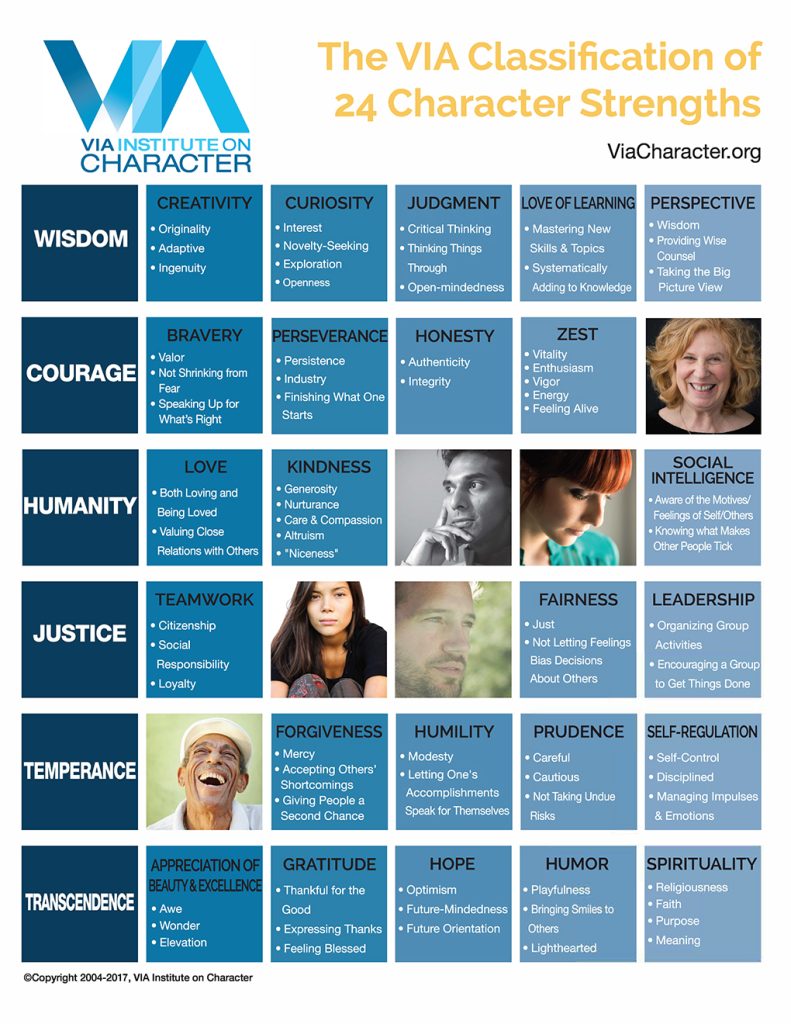Character strengths play a pivotal role in exploring human virtues and the various dimensions of our personalities. These strengths, intrinsic to our being, guide our actions, influence our relationships, and shape our lives.

Below, we present a comprehensive list of character strengths, inviting you to discover the qualities that resonate most profoundly with who you are and aspire to be. This list serves as a tool for reflection, self-awareness, and personal growth, allowing individuals to identify and cultivate their innate virtues.
Key Takeaways
- Gratitude Enhances Well-being: Actively recognizing and appreciating the good in life can significantly improve overall well-being and health and encourage stronger relationships.
- Fairness Promotes Social Harmony: Commitment to treating individuals equally and justly is essential for fostering social harmony and justice, reinforcing the importance of equity in a healthy society.
- Judgment is Critical for Objective Decision-Making: Engaging in critical thinking, evaluating evidence, and making informed decisions without personal bias is pivotal for individual and societal progress.
- Personal Integrity and Social Responsibility are Intertwined: The virtues discussed underscore the importance of personal integrity and a deep sense of responsibility toward societal welfare and positive norms.
- Collective Investment in Virtues Benefits Society: Fostering these strengths is a path toward personal fulfillment and a foundational element for building a more compassionate and equitable world.
How Does the VIA Inventory of Strengths Work?
The VIA Inventory of Strengths, often called the VIA Survey, is a psychological assessment tool designed to help individuals identify their unique character strengths. Built upon the principles of positive psychology, it aims to pivot the focus from what’s wrong to what’s strong within a person.
By completing a series of questions, the respondent receives a ranked list of 24 character strengths, providing insight into where their strengths lie.
The VIA Survey is grounded in a well-researched framework that categorizes character strengths under six broad virtues: wisdom, courage, humanity, justice, temperance, and transcendence. Each virtue encompasses a set of strengths that, when cultivated, can lead to increased happiness and life satisfaction.
The development of the VIA Classification came from a consensus among scientists who identified core virtues that transcended cultural, religious, and philosophical boundaries, making it universally applicable.
When taking the VIA Survey, individuals respond to statements that gauge how much they identify with specific behaviors and thought patterns.
The survey is self-reporting and requires honesty and introspection for accurate results. It is accessible online and can take 15 to 30 minutes to complete.
Upon completion, respondents receive a detailed report ranking their strengths from strongest to weakest, offering a unique mirror of their character.
Understanding and applying one’s character strengths, as unveiled by the VIA Survey, can have profound impacts. Personal development encourages individuals to leverage their top strengths in facing life’s challenges and building relationships.
Professionally, organizations use the VIA framework to craft teams that balance a wide range of strengths, promote job satisfaction and efficiency, and tailor leadership styles to enhance team performance.
The insight provided by the VIA Survey helps individuals align their actions and decisions with their core strengths, fostering a sense of authenticity and well-being.
Classification of 24 VIA Strengths and Virtues
The VIA Survey organizes character strengths into six broad categories of virtues, which represent core aspects of human excellence.
These virtues encompass wisdom, courage, humanity, justice, temperance, and transcendence.
- Wisdom: Creativity, Curiosity, Judgment, Love of Learning, Perspective;
- Courage: Bravery, Perseverance, Honesty, Zest;
- Humanity: Love, Kindness, Social Intelligence;
- Justice: Teamwork, Fairness, Leadership;
- Temperance: Forgiveness, Humility, Prudence, Self-Regulation;
- Transcendence: Gratitude, Hope, Humor, Spirituality, Appreciation of Beauty and Excellence.

Each virtue is a cluster of related strengths that together subscribe to the larger domain of human excellence it represents. Understanding these classifications can offer deeper insights into the nature of personal and societal well-being.
Wisdom and Knowledge are virtues that involve cognitive strengths. These relate to acquiring and using Knowledge in creative, curious, and critical ways. Strengths under this category include creativity, curiosity, judgment, love of learning, and perspective.
Individuals with pronounced strengths in this domain tend to be open-minded, reflective, and motivated by a hunger for discovery and understanding.
Courage is characterized by emotional strengths that involve the exercise of will to accomplish goals in the face of external and internal opposition. It includes bravery, perseverance, honesty, and zest.
Courageous people are often assertive and not easily discouraged by setbacks. They approach life enthusiastically and authentically, standing up for what they believe in, even when it is unpopular.
Humanity covers interpersonal strengths that focus on tending and befriending others. It manifests in love, kindness, and social intelligence. Individuals with humanity strengths are typically empathetic and compassionate and excel in nurturing relationships. They understand social cues and dynamics, making them adept at communication and fostering connections.
Justice reflects civic strengths that underpin a healthy community life. This virtue includes teamwork (or citizenship), fairness, and leadership. People who excel in justice are often fair-minded, work well in groups, and are skilled at organizing or leading others toward shared goals. They contribute positively to community life, ensuring fairness and cooperation.
Temperance involves strengths that protect against excess. It embodies forgiveness, humility, prudence, and self-regulation. Individuals who display temperance strengths are often disciplined, cautious, and forgiving. They have a well-developed sense of self-control and balance, enabling them to avoid extremes of behavior that may be harmful.
Transcendence refers to strengths that forge connections to the larger universe and provide meaning. This virtue encompasses appreciation of beauty and excellence, gratitude, hope, humor, and spirituality.
Those strong in transcendence often have an optimistic perspective, find joy and meaning in their lives, and appreciate the world’s richness and variety. They tend to rise above adversities, using humor or faith as coping mechanisms and are conscious of and grateful for the good things in their lives.
How To Assess Your Strengths?
The VIA Inventory of Strengths, or VIA-IS, is a psychological assessment tool specifically designed for adults, suitable for those aged 18 and older.
This assessment offers a deep dive into an individual’s character strengths, providing insights into the core areas of humanity, justice, temperance, and transcendence highlighted earlier.
By answering a series of questions, participants receive a ranked list of their top personal strengths, which helps them understand how these can be applied in various aspects of life, such as work, relationships, and personal growth. The VIA-IS is grounded in positive psychology and aims to shift focus from what’s ‘wrong’ with us to what’s ‘right.’
For younger individuals aged 10 to 17, the VIA Inventory of Strengths – Youth Version or VIA-Youth caters to their developing personalities and environments. Recognizing that children and teenagers are at a critical stage of character development, this assessment adapts the principles of the VIA-IS to be age-appropriate.
The VIA-Youth helps identify and foster their burgeoning strengths. Understanding their unique virtues early on nurtures a positive self-image and encourages the utilization of these strengths in their schooling, friendships, and family relationships.
Aside from the VIA assessments, the HIGH5 test offers another avenue for individuals to explore their strengths. It is unique because it identifies and leverages what an individual does best in a team setting.
It provides feedback on a person’s top five strengths, promoting understanding and application in professional and personal contexts.
The HIGH5 test emphasizes the value of knowing and using our strengths and team strengths to improve team performance, communication, and overall satisfaction in various spheres of life.
Engaging with these assessments provides valuable insights into one’s character strengths and how these can be applied to enhance one’s quality of life. Each tool approaches strength identification from slightly different angles, offering a comprehensive view that can benefit people at any stage.
Understanding and using our strengths makes us more likely to lead fulfilling and productive lives. Lastly, it’s essential to approach these assessments with an open mind and a willingness to self-reflect.
The results can guide personal and professional development, helping individuals focus on their strengths rather than fixate on weaknesses.
Whether through the VIA-IS, VIA-Youth, or HIGH5 test, discovering and understanding your unique strengths is a step toward personal growth and achieving greater happiness and success.
What is the Difference Between the VIA Inventory of Strengths and the VIA Character Strengths Survey?
The VIA Inventory of Strengths and the VIA Character Strengths Survey often confuse individuals due to their similar names and shared origins. Both tools are rooted in positive psychology and are designed to help individuals understand their unique strengths. However, their focus and application in real life slightly differ.
The VIA Inventory of Strengths primarily aims to identify an individual’s top character strengths. In contrast, the VIA Character Strengths Survey hones in on the nuances of how these strengths manifest in daily actions and decisions.
The VIA Inventory of Strengths offers a more general overview of an individual’s strengths, laying the foundation for personal and professional development. It’s like a broad-stroke paintbrush introducing you to the palette of your character strengths.
On the other hand, the VIA Character Strengths Survey goes deeper, analyzing how these strengths play out in specific situations. It focuses on the practical application of these strengths in everyday life, acting more like a detailed brush that helps color the lines of your daily interactions and choices.
When taking the VIA Inventory of Strengths, individuals receive a straightforward list of their top strengths. This is ideal for those new to character strengths or those seeking a quick insight into their characteristics.
The VIA Character Strengths Survey, however, offers a more interactive experience. It identifies strengths and provides users with scenarios and questions that help illustrate how these strengths can be utilized in various aspects of life.
This detailed approach caters to individuals ready to deep-dive into personal development. The outcomes of both assessments differ in terms of actionability. The Inventory is best for those seeking to identify their strengths broadly and perhaps begin thinking about how to apply them. It gives you the “what” of your strengths.
However, the VIA Character Strengths Survey is designed to translate awareness into action, offering a clearer picture of the “how” – how to apply these strengths in real-world scenarios. It’s more tailored to those wanting to make immediate changes or improvements in their personal or professional lives.
Regarding personal growth, the VIA Inventory of Strengths might be the first step on a longer journey of self-discovery and improvement. It’s about identifying your core strengths and contemplating their significance.
With its emphasis on application, the VIA Character Strengths Survey can significantly accelerate personal growth. It provides actionable insights that encourage individuals to actively integrate their strengths into daily life.
This hands-on approach ensures that users not only recognize their strengths but also understand how to wield them effectively to enrich their lives and the lives of those around them.
Understanding the different focuses and applications of the VIA Inventory of Strengths and the VIA Character Strengths Survey can profoundly impact how individuals engage with these tools. While both aim to bolster self-awareness and personal development, their methodologies and outcomes cater to varied needs and stages in one’s growth journey.
Whether at the beginning of your exploration of character strengths or looking to apply your strengths in more concrete ways, recognizing the distinction between these tools can guide your path to self-improvement and fulfillment.
What Are the Rarest VIA Character Strengths?
Among the VIA character strengths, zest stands out as one of the rarer qualities. Zest refers to approaching life with excitement and energy, not doing things halfway or reluctantly. Individuals with high zest often feel alive and engaged in all their activities, radiating vitality and a positive spirit.
This strength is particularly impactful because it can massively influence one’s overall well-being and satisfaction with life.
However, its rarity suggests that not everyone finds it easy to approach daily activities enthusiastically, possibly due to varying life situations, inherent personality traits, or the absence of conducive environments that foster zest.
Another rare but profoundly impactful strength is the appreciation of beauty and excellence.
This involves recognizing and valuing beauty, excellence, or skilled performance in various domains of life, including nature, art, and everyday experiences.
People strong in this area tend to experience a high sense of wonder, awe, or elevated feelings when encountering such phenomena.
Despite its powerful effect on enhancing life satisfaction and fostering positive emotions, it’s not commonly found at the top of individual strength profiles. This rarity might be due to contemporary lifestyle and societal focuses that often overlook these aspects of life or fail to encourage their appreciation actively.
Gratitude, while widely acknowledged as a desirable trait, emerges as a rare strength in the VIA character profiles. It goes beyond mere thankfulness for specific things and involves a broader appreciation for what one has in life, leading to a general state of thankfulness and positivity.
The rarity of gratitude as a dominant strength might point to the tendency to focus on what’s lacking or what can be improved rather than valuing what’s already present.
Cultivating gratitude can significantly enhance mental health and personal well-being, indicating its potential as a powerful but underutilized tool in personal development.
Leadership, defined in the VIA framework as the ability to encourage a group to get things done while maintaining good relations within the group, is also relatively rare as a top character strength.
This might be because effective leadership requires complex skills-including empathy, communication, and decisiveness-that might not naturally co-occur in most individuals.
Additionally, opportunities to develop and exercise leadership skills may be limited for many people, contributing to its rarity. Nonetheless, those who possess leadership as a core strength often find themselves in influential positions, capable of making significant positive changes in their communities and environments.
Lastly, forgiveness is identified as one of the less common VIA character strengths. Forgiveness involves a conscious decision to release feelings of resentment or vengeance toward a person or group who has harmed you, regardless of whether they deserve your forgiveness.
Its rarity can be attributed to the natural human inclination towards holding grudges or seeking retribution as a response to perceived wrongs. However, cultivating forgiveness can lead to healthier relationships, decreased anxiety and stress, and higher happiness and satisfaction.
Forgiveness has the potential for profound personal and relational transformation despite its scarcity.
What is the VIA Character Strengths Scale?
The VIA Character Strengths Scale is a psychological tool developed to help individuals identify and comprehend their core character strengths.
Derived from the broader field of positive psychology, this scale is grounded in the idea that focusing on and cultivating one’s inherent strengths can significantly impact one’s well-being and quality of life.
Unlike traditional approaches that often emphasize deficits or areas of improvement, VIA shifts the spotlight towards personal growth and positive traits.
Character strengths are more than just innate talents or skills; they are moral traits that form the foundation of our identity and guide our actions and decisions. Strengthening these characteristics can lead to a fuller, more meaningful life.
For instance, cultivating virtues like kindness, bravery, and honesty can enhance personal relationships and improve professional performance. Recognizing and developing your character strengths can be a powerful strategy for overcoming challenges and achieving goals.
Leadership is uniquely positioned within the spectrum of character strengths, requiring a synthesis of various skills and dispositions.
Authentic leadership transcends the ability to manage tasks and people; it involves inspiring others toward a shared vision, demonstrating empathy, fostering a positive culture, and making tough decisions when necessary.
The rarity of leadership as a top strength reflects the complexity of these duties, yet the impact of strong leadership – whether in small teams or large organizations – can be monumental in driving forward positive change.
Forgiveness stands out as a profoundly transformational strength. It challenges the instinctive human reaction to cling to negative emotions and promotes healing and closure. By releasing resentment’s hold on us, forgiveness frees up emotional energy that can be better spent on constructive and fulfilling endeavors.
It’s worth noting that forgiving is not about condoning wrong actions but moving past the hurt healthily. The benefits of this strength ripple out, touching every aspect of life, from personal peace to improved interpersonal dynamics.
Diving deeper into the VIA Character Strengths Scale invites one to consider how less common strengths like forgiveness and leadership can be consciously cultivated.
Engaging in self-reflection, seeking out opportunities for personal growth, and setting intentional goals related to these areas can significantly enhance one’s capacity for these virtues.
Doing so contributes to one’s personal development and benefits those around them, creating a more supportive and compassionate environment for all.
What Is the VIA Top 5 Report?
The VIA Top 5 Report is a specific output from the VIA Character Strengths Survey that identifies an individual’s five most prominent character strengths.
Rooted in positive psychology, this survey and its resulting report aim to illuminate the positive aspects of an individual’s personality, facilitating a better understanding of how these strengths can be employed to lead a happier and more fulfilling life.
What Are the Most Common VIA Strengths?
According to comprehensive studies by the VIA Institute on Character, the most common strengths across various populations include kindness, honesty, gratitude, fairness, and judgment.
People across different cultures often report these traits as the ones they identify with the most, suggesting a universal appreciation for these virtues.
Kindness and honesty stand out as two of the most valued strengths. Kindness encapsulates generosity, nurturance, care, compassion, and selfless love.
It is the glue that binds social relationships, fostering a sense of community and belonging. On the other hand, honesty involves authenticity, integrity, and a commitment to truthfulness, regardless of the situation.
Together, these strengths enhance personal character and fortify trust and reliability in relationships.
Gratitude, another widely acknowledged strength, involves recognizing and appreciating the good things in life and expressing thanks. It is linked to increased well-being, improved health, and stronger social bonds.
Fairness refers to treating everyone equally and justly, without discrimination, vital for maintaining social harmony and justice. These virtues are crucial for developing a sense of social responsibility and promoting equity and positive societal norms.
Judgment, or critical thinking, is the capacity to think things through, examine the evidence, and arrive at well-founded conclusions without emotion or personal bias. It’s a key strength for decision-making and problem-solving in an increasingly complex world.
This strength enables individuals to assess situations objectively, consider various perspectives, and make informed decisions that benefit themselves and the broader community.
The prevalence of these strengths suggests a common thread of valuing personal integrity, social harmony, and the welfare of others. Cultivating these virtues can lead not only to personal fulfillment but also to more robust, healthier societies.
Therefore, engaging with and developing these common strengths is a personal endeavor and a collective investment in a more compassionate and just world.
What Are VIA Character Strengths for Students?
The VIA (Values in Action) character strengths framework for students identifies 24 universal human strengths and virtues. It was created by psychologists Christopher Peterson and Martin Seligman based on research spanning over 50 cultures and thousands of individuals.
These strengths are believed to be present in all individuals, regardless of background or culture, and can be developed and nurtured throughout their lifetime. The VIA character strengths are grouped into six categories: wisdom, courage, humanity, justice, temperance, and transcendence.
The VIA assessment is a scientifically validated survey that measures an individual’s character strengths and provides personalized feedback on developing them further.
It has been used in various fields, such as education, counseling, and workplace development, to help individuals identify and utilize their strengths to achieve personal and professional success.
Conclusion
The exploration of common strengths such as gratitude, fairness, and judgment underlines these virtues’ essential role in nurturing personal growth and fostering a more equitable and compassionate society.
Individuals can contribute to a culture of resilience, understanding, and mutual respect by valuing and promoting these qualities.
Cultivating these strengths is a means of personal betterment and a pathway toward building stronger social bonds and a harmonious global community. It beckons a call to action for each of us to introspect and actively work on embodying these virtues in our daily lives, thereby enriching our existence and those around us.


